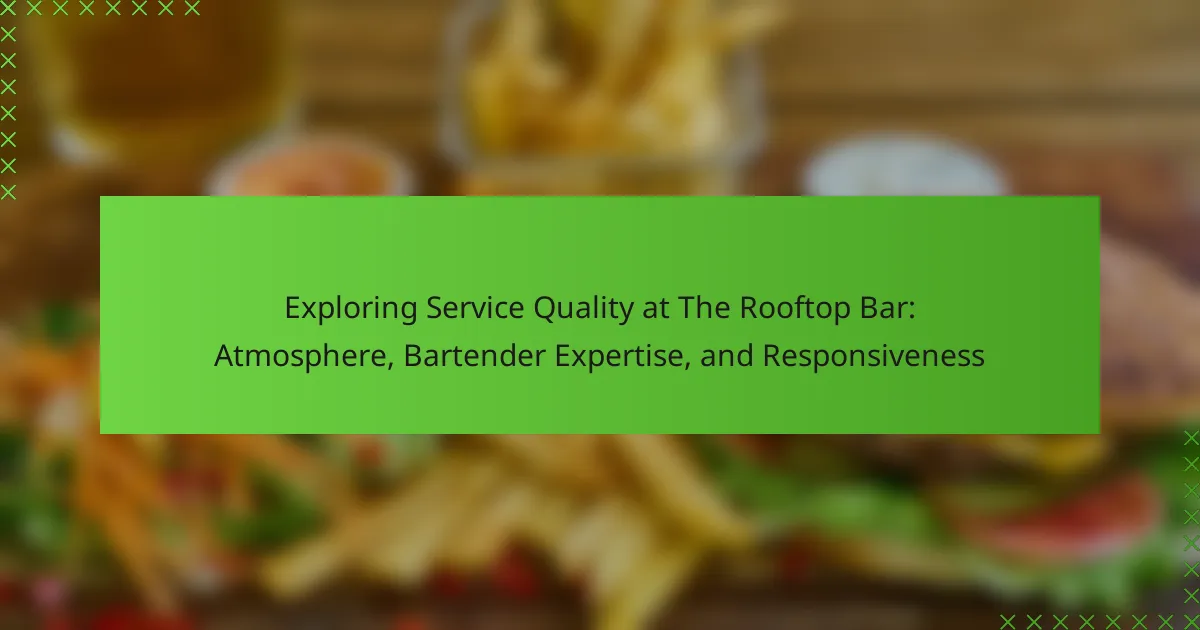
What defines service quality at The Rooftop Bar?
Service quality at The Rooftop Bar is defined by atmosphere, bartender expertise, and responsiveness. The atmosphere is characterized by a vibrant and inviting setting. This ambiance enhances customer experience and satisfaction. Bartender expertise includes skillful drink preparation and knowledgeable recommendations. Skilled bartenders contribute to a high-quality service experience. Responsiveness refers to the promptness and attentiveness of the staff. Quick service and personalized attention are critical to customer satisfaction. These elements collectively ensure a positive and memorable experience for patrons.
How does the atmosphere influence the overall experience?
The atmosphere significantly influences the overall experience at a venue. It encompasses elements like lighting, music, and decor. These factors affect customer mood and perception. A warm, inviting atmosphere can enhance relaxation and enjoyment. Conversely, a chaotic or unwelcoming environment may detract from the experience. Studies show that ambient conditions can impact customer satisfaction ratings. For instance, a comfortable temperature and pleasant background music increase patrons’ willingness to return. Thus, the atmosphere plays a crucial role in shaping the overall impression of the rooftop bar experience.
What elements contribute to the atmosphere at The Rooftop Bar?
The atmosphere at The Rooftop Bar is influenced by several key elements. These include the panoramic views of the city skyline, which create a visually stunning backdrop. The choice of ambient lighting contributes to a relaxed and inviting mood. Additionally, the selection of music enhances the overall experience by setting the tone for social interactions. Comfortable seating arrangements promote a sense of relaxation and encourage guests to linger. The presence of greenery and decorative elements adds to the aesthetic appeal. Furthermore, attentive service from staff enhances the overall ambiance, making guests feel valued. These combined elements create a distinctive atmosphere that attracts patrons seeking a unique experience.
How does lighting affect the ambiance of the bar?
Lighting significantly influences the ambiance of a bar. It sets the mood and creates an inviting atmosphere. Soft, warm lighting can promote relaxation and social interaction. Conversely, bright, harsh lighting may create a more energetic or sterile environment. The color temperature of lights also affects emotional responses. For example, warmer tones can evoke comfort, while cooler tones may feel more modern. Studies show that lighting impacts customer behavior and satisfaction. A well-lit space can enhance the overall experience, encouraging patrons to stay longer and return.
What role does bartender expertise play in service quality?
Bartender expertise significantly enhances service quality. Skilled bartenders can craft high-quality drinks efficiently. Their knowledge of mixology leads to better drink recommendations. Expertise also allows bartenders to engage with customers effectively. This engagement creates a welcoming atmosphere. Studies show that customer satisfaction increases with bartender skill level. A survey by the Beverage Testing Institute found that expert bartenders received higher ratings for drink quality. Overall, bartender expertise is crucial for delivering exceptional service in bars.
What qualifications and skills are essential for bartenders?
Bartenders must have a combination of qualifications and skills to excel in their roles. Essential qualifications include a high school diploma or equivalent. Many bartenders also complete bartending school or training programs. Knowledge of mixology is crucial for creating cocktails. Strong communication skills enhance customer interaction and service quality. Bartenders should possess good multitasking abilities to handle busy environments. Familiarity with local laws regarding alcohol service is necessary for compliance. Experience in customer service is often preferred by employers. Lastly, physical stamina is important for long shifts on their feet.
How does bartender knowledge of cocktails enhance customer satisfaction?
Bartender knowledge of cocktails significantly enhances customer satisfaction. Skilled bartenders can recommend drinks tailored to individual preferences. This personalized service fosters a connection between the bartender and the customer. Knowledgeable bartenders can also educate customers about cocktail ingredients and preparation methods. This transparency builds trust and appreciation for the craft. Furthermore, bartenders can create unique and memorable experiences through their expertise. According to a study published in the Journal of Hospitality Management, expert service can lead to higher customer loyalty and repeat visits. Overall, a bartender’s cocktail knowledge directly influences the quality of the customer experience.
Why is responsiveness critical in service quality?
Responsiveness is critical in service quality because it directly impacts customer satisfaction. Timely responses to customer needs create a positive experience. Customers value quick service and attention to their requests. Studies show that 70% of customers consider responsiveness a key factor in service quality. When businesses respond promptly, they build trust and loyalty. This leads to repeat visits and positive word-of-mouth. In the context of The Rooftop Bar, attentive bartenders enhance the overall atmosphere. Their responsiveness can significantly elevate the guest experience.
How does responsiveness impact customer perception of service?
Responsiveness significantly impacts customer perception of service. Quick responses to customer inquiries create a sense of value and importance. Customers feel prioritized when their needs are addressed promptly. This can enhance overall satisfaction and foster loyalty. According to a study by the Harvard Business Review, timely service can increase customer retention by up to 5%. In contrast, delays can lead to frustration and negative perceptions. Therefore, responsiveness is crucial in shaping a positive customer experience.
What are some examples of effective responsiveness in service?
Effective responsiveness in service includes timely communication, personalized attention, and proactive problem-solving. For example, a bartender promptly acknowledges a customer’s order and provides updates on wait times. Additionally, staff who remember regular customers’ preferences demonstrate personalized service. Proactive problem-solving occurs when a server addresses a customer’s complaint before it escalates. Research shows that 70% of customers value quick responses to inquiries. Furthermore, effective responsiveness can increase customer satisfaction and loyalty, enhancing overall service quality.

How do these factors interrelate to enhance customer experience?
Atmosphere, bartender expertise, and responsiveness interrelate to enhance customer experience by creating a cohesive and enjoyable environment. A well-designed atmosphere sets the mood and influences customer perceptions. It encourages relaxation and social interaction, which are crucial for a positive experience. Bartender expertise contributes by providing high-quality service and personalized recommendations. Skilled bartenders can create unique cocktails that align with the atmosphere, enhancing overall satisfaction. Responsiveness ensures that customer needs are met promptly, minimizing wait times and addressing concerns effectively. Studies show that venues with attentive service see higher customer retention rates. Together, these factors create a seamless experience that keeps customers returning.
What connections exist between atmosphere and bartender expertise?
Atmosphere significantly influences bartender expertise. A well-designed atmosphere enhances a bartender’s ability to engage with customers. It creates a conducive environment for social interaction. Bartenders can showcase their skills more effectively in an inviting setting. Studies show that ambiance affects customer satisfaction and perceived service quality. For instance, a study by Bitner (1992) highlights how physical surroundings impact service encounters. This connection suggests that a positive atmosphere can elevate a bartender’s performance and customer experience.
How does responsiveness tie into the overall service quality at The Rooftop Bar?
Responsiveness is a critical component of overall service quality at The Rooftop Bar. It directly affects customer satisfaction and experience. Quick responses to customer inquiries and needs create a welcoming atmosphere. Efficient service enhances the perception of value among patrons. Studies show that responsiveness correlates with positive reviews and repeat visits. For example, a survey by the National Restaurant Association indicates that 70% of customers value timely service highly. This demonstrates that responsiveness significantly impacts customer loyalty and overall service quality at The Rooftop Bar.

What specific aspects of service quality can be improved?
Aspects of service quality that can be improved include bartender training, customer engagement, and atmosphere enhancement. Bartender training can increase expertise in cocktail preparation and customer interaction. Enhanced bartender skills lead to higher customer satisfaction and loyalty. Customer engagement can be improved through personalized service and attentive communication. Studies show that engaged customers are more likely to return. Atmosphere enhancement can involve improving lighting, seating comfort, and music selection. A pleasant atmosphere can significantly impact overall customer experience. Implementing these improvements can lead to better service quality at The Rooftop Bar.
What strategies can enhance the atmosphere at The Rooftop Bar?
Implementing live music can enhance the atmosphere at The Rooftop Bar. Live performances create an engaging environment. They encourage social interaction among patrons. Utilizing ambient lighting can also improve the setting. Soft, warm lights can make the space feel inviting. Seasonal decorations can reflect the time of year. This adds a festive touch to the atmosphere. Offering themed nights can attract diverse crowds. These events foster a sense of community. Engaging staff in customer service training can improve interactions. Friendly bartenders enhance the overall experience for guests.
How can music selection improve the bar’s atmosphere?
Music selection can significantly enhance a bar’s atmosphere. The right music creates an inviting environment for patrons. It influences mood and encourages social interaction. Studies show that upbeat music can increase spending and prolong visits. For instance, a study by Milliman (1982) found that fast-tempo music led to increased sales in a restaurant setting. Additionally, music can reinforce the bar’s theme and branding. A cohesive auditory experience complements the visual elements of the space. This alignment fosters a memorable experience for guests. Ultimately, thoughtful music selection contributes to overall customer satisfaction and loyalty.
What decor changes could elevate the customer experience?
Incorporating natural elements can elevate the customer experience significantly. Adding plants or greenery creates a calming environment. Research shows that biophilic design improves mood and reduces stress. Enhancing lighting with warm tones fosters a welcoming atmosphere. Studies indicate that appropriate lighting can increase customer satisfaction. Utilizing local artwork adds a unique touch and supports community artists. This approach can create a sense of belonging for patrons. Incorporating comfortable seating arrangements encourages longer stays. Data shows that comfortable environments lead to increased customer retention. Overall, these decor changes can transform the customer experience positively.
How can bartender training programs improve service quality?
Bartender training programs can improve service quality by enhancing skills and knowledge. These programs teach bartenders the fundamentals of mixology, customer service, and product knowledge. Improved skills lead to faster service, which increases customer satisfaction. Training also emphasizes the importance of communication and responsiveness. Bartenders learn to engage with customers effectively, addressing their needs promptly. According to a study by the National Restaurant Association, establishments with trained staff report higher customer retention rates. This indicates that trained bartenders positively impact overall service quality.
What topics should be included in bartender training for better service?
Bartender training for better service should include topics such as customer service skills, cocktail preparation techniques, and product knowledge. Customer service skills enhance interaction with patrons and improve overall satisfaction. Cocktail preparation techniques ensure quality and consistency in drink offerings. Product knowledge allows bartenders to recommend drinks effectively. Additionally, training should cover bar equipment usage and maintenance. Understanding health and safety regulations is crucial for compliance. Knowledge of local laws regarding alcohol service is also important. Lastly, conflict resolution strategies can help manage difficult situations.
How can ongoing education keep bartenders updated on trends?
Ongoing education keeps bartenders updated on trends by providing them with the latest industry knowledge and skills. It allows bartenders to learn about new cocktail recipes, techniques, and ingredients. Regular training sessions can introduce bartenders to emerging trends like craft cocktails or sustainable practices. Workshops and seminars often feature industry experts who share insights into consumer preferences. Additionally, online courses can offer flexible learning opportunities for busy bartenders. This continuous learning helps bartenders adapt to changing market demands. According to the National Restaurant Association, 70% of consumers are interested in trying new drinks. Therefore, ongoing education is crucial for bartenders to remain competitive and relevant in the industry.
What best practices can ensure responsiveness in service?
Best practices to ensure responsiveness in service include timely communication, staff training, and customer feedback mechanisms. Timely communication involves addressing customer inquiries and concerns promptly. Research shows that 90% of customers expect a response within 10 minutes. Staff training equips employees with the skills to handle requests efficiently. Regular training sessions can improve service speed by up to 30%. Implementing customer feedback mechanisms allows businesses to identify areas for improvement. Studies indicate that companies using feedback tools see a 20% increase in customer satisfaction. Overall, these practices create a responsive service environment that enhances customer experience.
How can staff training improve responsiveness to customer needs?
Staff training can significantly improve responsiveness to customer needs by enhancing employees’ skills and knowledge. Trained staff are more adept at identifying and addressing customer preferences. This leads to quicker service and personalized interactions. Training also fosters a better understanding of the menu and services offered. Employees can provide accurate recommendations based on customer inquiries. Furthermore, ongoing training encourages effective communication among team members. This ensures that customer feedback is shared and acted upon promptly. Research indicates that businesses with well-trained staff see a 24% increase in customer satisfaction ratings. Overall, effective staff training directly correlates with improved responsiveness to customer needs.
What technology can assist in enhancing service responsiveness?
Artificial intelligence (AI) can assist in enhancing service responsiveness. AI technologies, such as chatbots and virtual assistants, provide immediate responses to customer inquiries. These tools can operate 24/7, ensuring that customers receive timely assistance. AI can analyze customer data to predict needs and preferences, allowing for personalized service. Additionally, AI can streamline operations by managing reservations and orders efficiently. This reduces wait times and improves overall customer satisfaction. Studies show that businesses using AI for customer service see a significant increase in responsiveness and engagement.
The main entity of the article is service quality at The Rooftop Bar, which is defined by three key attributes: atmosphere, bartender expertise, and responsiveness. The article provides an in-depth analysis of how each of these elements contributes to customer satisfaction and overall experience. It discusses the impact of atmosphere on mood and relaxation, the importance of bartender skills in drink preparation and customer engagement, and the critical role of responsiveness in enhancing service quality. Additionally, the article explores best practices for improving these attributes to ensure a memorable experience for patrons.
